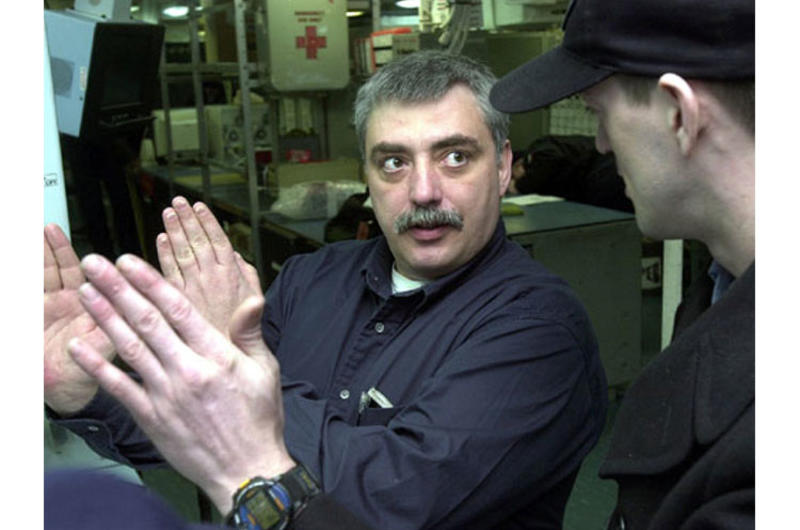

This website was created and maintained from May 2020 to May 2021 to commemorate the 75th anniversary of Stars and Stripes operations in the Pacific.
It will no longer be updated, but we encourage you to explore the site and view content we felt best illustrated Stars and Stripes' continued support of the Pacific theater since 1945.
Civilian part of ship's tech team

George Webb, a civilian technical representative of Northrop Grumman, talks about an electronics system for Naval aircraft with Petty Officer 3rd Class Timothy Russell aboard the USS Kitty Hawk.
By Rick Chernitzer | Stars and Stripes January 20, 2003
ABOARD THE USS KITTY HAWK — George Webb has, as they say in the Navy, more time in the bathroom aboard ship than many of the sailors on the USS Kitty Hawk.
He’s been to the Persian Gulf five times. He was there when the ship conducted special operations following the 9/11 attacks.
Singapore, the Philippines, Australia? He’s been there, done that.
In fact, the 41-year-old has been part of many underway periods aboard the USS Kitty Hawk and the USS Independence for nearly 12 years.
But Webb’s not a sailor. Never has been.
He’s a Northrop Grumman technical representative. The 17-year veteran of the Los Angeles-based defense contractor rides the aircraft carrier as one of a handful of civilians aboard.
His trek on the high seas began when the Independence changed ports from San Diego to Yokosuka to replace the USS Midway in 1991.
Webb’s job as a “tech rep” is to provide training to Navy technicians on a variety of equipment manufactured by his company. The Kitty Hawk is the only carrier to have civilian tech reps permanently attached, Webb said, because “they have to be ready quickly.”
He said he avoids actually doing any repairs himself.
“That’s their job,” he said. “If I’m in there doing the work, that’s something they’re not learning.”
He likens his job to that of a mentor.
“In some ways it is. Somebody has a problem they need help with, and I’ll walk them through the problem, to help them learn for themselves what’s wrong. In that way, it’s very similar to a vocational school.”
As an electronic technician on the A-6 Intruder while in the Marine Corps, Webb said he “liked what I was doing, so when it came time for me to get out, I put in a résumé and was hired.”
A soft-spoken man with salt-and-pepper hair and mustache, Webb almost blends into the ship’s Aircraft Intermediate Maintenance Department electronics shop.
While at sea, he wears a khaki uniform, just like the chiefs and officers. The major difference is his collar devices, which identify him as a technician. His hair cut close to military standards, he sticks out among many of the civilians, some of whom sport long ponytails and beards.
“Sometimes, civilians want to make it obvious they’re civilians,” he said.
Of course, being a civilian on a naval vessel does have its advantages: Webb said he pretty much makes up his own schedule when he’s in the shop; has an officer’s stateroom and eats in the officer’s wardroom.
And while he doesn’t see it a lot here, he said on other ships, sailors tend to regard civilian riders as a pain.
“They make it clear you’re in the way,” he said. “But here, they know you’re a part of the ship’s crew.”
Of the countless sailors he’s met, befriended, and then said goodbye to the past 12 years, Webb said, “It’s hard to watch people come and go. You do get a sense of loss from that. But sometimes, you run into them again.”
One example was a second class petty officer Webb knew on the Independence, who came to the Kitty Hawk and then was commissioned an ensign.
“They had the commissioning ceremony right here in the shop,” Webb said, noting that when it came time for giving out the silver dollar, a tradition whereby newly commissioned officers give a silver dollar to the first person to salute them, “he gave it to me.”
Webb is “a wealth of knowledge,” said Petty Officer 3rd Class Timothy Russell. “We’ve learned a lot from him.”
“He’s very patient,” said Petty Officer 3rd Class Chett Jacobson. “His style is for us to try and figure out what we can before we ask for his help. He gets us on the right track.”
The job pays fairly well, although not famously, Webb said. His children attend Department of Defense Dependent Schools. He and his wife, Elena, have exchange and commissary privileges, and he gets housing and cost-of-living allowances.
Like anyone on the ship, Webb has to be aware of the inherent dangers of sailing into harm’s way. He has a gas mask, and he’s been trained on how to react to different situations, so he’s not defenseless. During general quarters drills, when the ship is in a state of battle readiness, his station is the shop.
He doesn’t, however, get any danger pay when the ship rides into a hot spot.
But it isn’t the money that keeps him on board, Webb said.
“Job satisfaction is about all there is,” he said. “In the end, if you’re doing something you like and you’re good at, it’s just that much more satisfying.”


